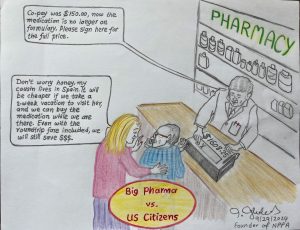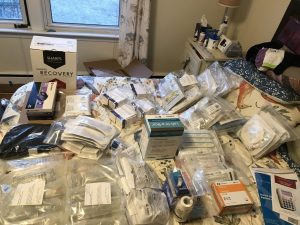- Home
- /
- Latest Voices
- /
- Page 41
Latest Voices
Making My Way with Grief
I make my way with grief. Our son Max died by suicide eight years ago. Quickly deciding against suicide for myself, I’ve found ways to cope.
I do twenty push-ups each morning, dedicating them to Max and using the physical pain to exorcise the emotional pain. I began this ritual soon after Max died, when I would start in on my day oblivious to the pain lying in wait beneath my sleep-refreshed, early-morning optimism. Then, at some moment, maybe hours later, I’d remember that Max was dead and double over in grief.
The Solace of Anger
I first felt driven to pursue a medical education during my Peace Corps service in rural southern Belize. My work partner was the village’s community health worker. Our duties varied and depended on the season, weather, and amount of laundry that needed washing that day—which we scrubbed at the river’s edge with freshly picked soapberries. Sometimes we made oral rehydration salts for villagers with diarrhea. Or we visited the pregnant and the elderly. Or we made tortillas.
On the Floor
Aunt Jenny is in her chair knitting when she asks me to make her some tea. “Nice and hot,” she says in her whispery voice. “Warm the cup with boiling water and pour it out.” She’s forgotten that she tells me this every time I make her a cup of tea. I sigh and head to the kitchen, fill the tea kettle, and am taking the fragile porcelain cup from an upper cabinet when I hear her fall.
The Children Not Frequently Mentioned
I held her hand. We weren’t quite twenty years old. I wasn’t sure what decision I would have made, I’m still not. All I knew was that she was the one whose opinion mattered in this moment. Today it was her choice, and the most I could do was try to be there for her.
Meditation in Medicine
The sun shone brightly reflecting the ripples off the pond. Closing my eyes, I tried meditation for the first time in a long time. Balancing caring for patients in the wards, being evaluated by my team, and applying for residency, I felt more stressed than I had been in a long time.
Shattered
It was 6:30 a.m., and I was nearing the last hour of a nighttime rotation on labor and delivery. Over the previous eight hours, my team had overseen two vaginal deliveries and two c-sections, one emergent. During this procedure, as the medical student on the team, I was charged with requesting hemostatic agents, STAT, from the main OR. As I ran past the patient’s anxious husband with the hemorrhage cart, I informed him, trying desperately to hide the terror in my voice, that his new baby boy was healthy but that the doctors were still treating his wife.
Situational Depression?
Sad, tired, and vulnerable, I plopped into my usual seat in my therapist’s office. As a third-year medical resident, I felt like a poster child for imposter syndrome. For months, my mood had been low, I was not enjoying life, and I was struggling.
My therapist gently commented, “I think it’s time for meds, Pam.”
Taking Charge
I take Osher classes—courses designed for senior citizens—to exercise my mind. However, I had another reason for recently enrolling in a class on “Adapting to the New Normal”: a desire to improve my coping skills. When facing an upsetting situation, I typically cry, gobble bags of dark chocolate M&Ms, retreat from society, or sink into depression. Sometimes, I simultaneously do all four.
August More Voices: Coping
Dear Pulse readers,
For years my family has attended religious services at a Unitarian Universalist congregation. In this congregation, our minister gets Sunday off every few weeks, and the service is led by a different group of congregants. Everyone gets to participate.
The themes of these congregant-led services often involve coping. They might be summed up as: “What keeps me going?”










